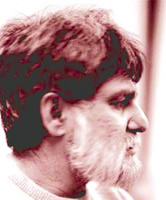Amjad Bhatti < سجن > ظفریاب احمد > مضمون>
A Stylus Is No More
Zafaryab Ahmad would please and annoy without having to change his tone and tenor
By Amjad Bhatti
The News 12-02-2006

The news of Zafaryab's death brought back memories of the time spent with him in Lahore and Islamabad a few years ago. He was on bail in a sedition case and was working with Sustainable Development Policy Institute and living at Tariq Banuri's residence in Islamabad. Benazir Bhutto was the prime minister for a second time and we would party on the stairs in front of the parliament house -- to indulge our misplaced romanticism with the PPP government. Sitting there we would engage in reckless if intense debates on the relevance and failure of Marxism in the subcontinent and cry and laugh at ourselves.
Zafaryab Ahmad died of cardiac arrest at the age of 53 on January 25 in Lahore. Growing up in Lahore's Gawalmandi, he returned to the city from the United States on October 8 to complete the circle. He had a masters degree in Political Science from the Punjab University and did various teaching stints -- at the Faisalabad Agriculture University, Aitchison College and the Administrative Staff College Lahore. During his career as journalist, he worked with, weekly the Viewpoint and The Frontier Post and for The News. In 1990, he also edited daily Sajjan, the first ever Punjabi-language newspaper in Pakistan. He also worked for SDPI and the Pakistan Institute of Labour Education and Research (PILER) for short periods.
He was arrested in 1995 and charged with treason for his reporting on the death of a young bonded labourer, Iqbal Masih. In 1998, he was selected by Colby College for the first Oak Institute Human Rights Fellowship designed for international human rights activists taking personal risks. With the intervention of US Senator Tom Harkin and President Bill Clinton, Zafaryab was allowed to leave Pakistan and join Colby College in the US. At the completion of the fellowship, he applied for asylum in the United States and enrolled in a graduate programme in Sociology at the State University of New York at Binghamton.
A devout advocate of egalitarian human rights, Zafaryab was an eloquent orator, a prolific writer and a die-hard activist. Blunt, fearless, frank and sometimes fastidious, he was loved for the same reasons for which he was hated. Fayyaz Baqir, his senior at the Punjab University, says that Zafaryab, who was dubbed as an 'anarchist' by leftists, formed a group called 'The Vulgars' at the university. "It was a fun-loving bunch with its own anthem, slogans, rituals and songs sung by the members sitting on benches along the main corridors at the new campus," recalls Baqir.
The free spirit persisted in the face of all that Zafaryab had to brave in the following years until we got together in Islamabad in the mid-1990s. It was an especially unforgettable night as a group of friends set out for the shrine of Imam Bari to pay homage to the saint on the occasion of his annual urs. Once we got near the mausoleum, Zafaryab jumped out of the car and started dancing to the beat of the dhol. 'Wangan charha lo kuriyo mairey murshid dey darbar diyan,' (O girls, adorn yourselves with bangles from the shrine of my master) were the lyrics being sung by the devotees. Zafaryab was ecstatic -- him doing a dhamal encircled by a group of Bari Imam's devotees. They kissed his hands. They showered money on him.
Zafaryab was rash, no doubt, and his frankness often offended his friends. One Christmas he took me to greet Alys Faiz and sat in her feet and remembered Faiz Sahib. "'We' are the spiritual siblings. 'They' are just selling Faiz," he said, raising his voice for emphasis in his customary manner. As we were coming out of Alys Faiz's residence, we ran into Shoaib (Hashmi) Sahib. He looked at Zafaryab and spontaneously commented in Lahori Punjabi: "Sub chooh'rhey akathey ho gaye nay."
It was amazing how Zafaryab could 'trespass' into anybody's house. So after Alys, it was ZIM's turn to play host to him. A common friend used to say that Zafaryab would first declare his friends' wives to be his sisters and then hatch a friendly conspiracy against his 'brothers-in-law'.
Zafaryab was depressed because of his implication in the sedition case. Pervaiz Saleh -- a soft-spoken and kind-hearted political residue of a radical decade in Pakistan and a close friend and one-time class fellow of Zafaryab -- tried to rehabilitate him. Zafaryab was given an assignment which could keep him occupied. But he found time out, only a couple of days into his new job. The result was a column in The News that was highly critical of the working of the literacy commission. No one including Pervaiz Saleh could disagree with the points raised in it.
While he lived in a flat in the F/8 Markaz Islamabad, Zafaryab bought a computer. He declared that now was the time for him to write a novel and in the comfort of a pair of loose shorts, he would be desk-bound for hours, scripting his imagination. I remember that he still had his red short on.
"Stylus" he said "would be the name of my novel". "You know why? Stylus is the small needle which runs over each track of a gramophone record. This needle is the abstract of my novel. The stylus of our society is broken and this is the dilemma I am dealing with in my novel."
Cathartic cries, untrimmed laughter and passion of debate was Zafaryab in essence. I wish he could stay with us for some more time -- at least to finish one more circle of the stylus. |


